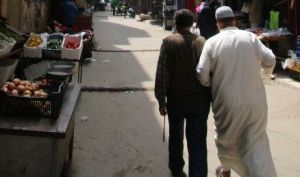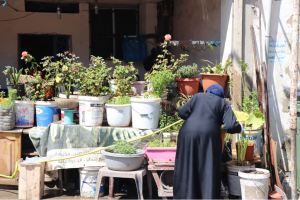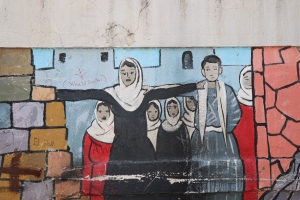In this piece, Tessa Ubels traces the use of the word ‘empowerment’ within the context of humanitarian responses to refugees in Lebanon. Drawing on her fieldwork in Beirut, and applying Deepa Narayan-Park’s conceptual framework, Tessa critically assesses the effectiveness of the focus on ‘empowerment’ within the humanitarian network of international and local organisations responding to refugees living in Lebanon. Despite this focus, refugees in Lebanon remain without basic human and political rights within state-led refugee policy and response, within which the underlying principles of empowerment do not exist. Tessa traces both the official and unofficial motivations of humanitarian funding in this context and in so doing contributes to the Southern Responses to Displacement project, which examines these themes in our Introductory Mini Blog series and in a number of different pieces found here, here and here.
If you find this piece of interest you may like to access the recommended reading at the end of this piece.
Who is empowered?
by Tessa Ubels, Research and Education Assistant at the Institute of Security and Global Affairs, Leiden University
‘Empowerment’ is one of the key terms, or rather buzzwords, structuring today’s humanitarian responses. By tracing the use of this term in the humanitarian response for Syrian refugees in Beirut, Lebanon, it is possible to uncover relations of power. Because what is the meaning of empowerment, in a context where refugees’ rights and lives are severely restricted?
Lebanon hosts the highest number of refugees per capita in the world. In spite of this, the Lebanese state has never ratified the 1951 United Nations Convention Relating to the Status of Refugees nor its accompanying 1967 Protocol. The Lebanese state neither recognises nor protects the rights stipulated in the convention. This is reflected in the dire living situation of many Syrian refugees in Lebanon. Only 22% of Syrian refugees has obtained legal residency, creating fear of arrest and detention, and hampering people’s ability to access healthcare, housing and employment. 73% of Syrian households in Lebanon live below the poverty line. As President Bashar Al-Assad is consolidating his grip on power in Syria, the chances of safe return are almost non-existent– carrying risks such as conscription, detention and extreme poverty. After 9 years of crisis, the state of uncertainty remains protracted. Current developments in Lebanon, such as the economic crisis and the COVID-19 pandemic, further deteriorate living conditions of poorer communities, Syrian, Lebanese, Palestinian and Iraqi alike.
A large humanitarian network of international and local organisations has formed itself to improve the situation of Syrian refugees in Lebanon. These organisations, although different in size and goal, regularly promote ideals related to ‘empowerment’ (such as ‘resilience’ and ‘capacity-building’). They argue against more traditional forms of humanitarian aid which would create dependency amongst aid receivers. Instead, they aim to work towards sustainable development, for both refugees and host communities, to improve socioeconomic circumstances in the long term.
Principles underlying empowerment, however, stand in stark contrast with the daily reality of Syrian refugees in Lebanon. Empowerment relates to reforming the relations between the powerful and the powerless. The numbers above show the inequality Syrian refugees face in Lebanon, because of the restrictions put upon them. To overcome this disparity, the principal relation which should be transformed is the one between the Lebanese state and Syrian refugees.
Following Deepa Narayan-Park’s conceptualization of empowerment, we can identify four necessary conditions to achieve this transformation: access to information, inclusion and participation, accountability, and local organisational capacity. In the context of Lebanon, we can translate these conditions in the following ways: First, Syrians should have access to information regarding refugee policy, which is fuzzy and continuously changing. Second, they should have the right to legal residency and be included in society. Third, they should be able to hold the Lebanese state accountable when they face persecution and detention. Fourth, they should be allowed to form organisations, to legally strengthen their own political and humanitarian responses. In short, Syrians in Lebanon should be allowed to enact their human rights.
Importantly, these rights are deliberately not bestowed on them. The Lebanese government’s policies and implementation reflect ambiguity which strengthens its own position, by reducing its accountability. The Lebanon Crisis Response Plan, the document which lays down the cooperation between the Lebanese government and the humanitarian network, specifically states that Syrian refugees should either return to Syria, or be resettled to third countries, and that ‘international partners recognise that the stay of displaced people in Lebanon is temporary’. This rhetoric allows political parties carte blanche to reject any responsibility, while the harsh conditions increasingly put pressure on refugees to leave. One example can be found in the demolishment of Syrian refugee shelters in 2019, an act which municipalities defended on the basis of a law from 2004 that until then was rarely ever enforced. Unless the Lebanese government is willing to recognise human rights of refugees, empowerment cannot be realised.
So, why does this humanitarian aid system continue when it cannot achieve empowerment? By conducting fieldwork in Beirut, I came to understand the governance of the humanitarian response, and the political economy behind this ‘hybrid’ form of governance. These actors, who together form a formal and informal, state and non-state system, primarily pursue their individual interests.
The humanitarian organisations rely on donor organisations for funding, and on the Lebanese government to gain access to refugees and host communities. They receive some benefits in the form of work and financial resources but are often discouraged by the fact that they cannot deliver an ‘empowering’ response. Donors financing the humanitarian response, and specifically Western countries, wish to maintain the status-quo and have Syrian refugees stay in the region, in line with their national political interest. The Lebanese political elites benefit from the humanitarian system through financial inflows, and by safeguarding their political influence. The protests which emerged in October 2019, are directed against this corruption which has ruled the country for years.
The question is: who is empowered by the humanitarian response? To be aware of these power dynamics, opens up important ways to critically assess the effectiveness of humanitarian aid, and to explore its (un)intended implications. Ultimately, empowerment can reinforce the power of the powerful, instead of transforming inequality.
**
If you found this piece of interest please see the recommended reading list below:
al-Mehdi, D. (2019) ‘The Tribulations, and Deportations, of Syrian Guests in Turkey’
Berg, M. and Fiddian-Qasmiyeh, E. (2018) ‘Hospitality and Hostility towards Migrants: Global Perspectives—An Introduction‘
Fiddian-Qasmiyeh, E. (2018) ‘Histories and spaces of Southern-led responses to displacement’
Fiddian-Qasmiyeh, E. (2018) Internationalism and solidarity
Fiddian-Qasmiyeh, E. (2018) Refugee-refugee humanitarianism
Fiddian-Qasmiyeh, E. (2018) Faith based humanitarianism
Fiddian-Qasmiyeh, E. (2018) Pan-Arabism
Loris-Rodionoff, C. (2017) “Hope, Resilience and Uncertainty: A Day with Displaced Syrians in Southern Turkey”
Ozturk, M. (2018) ‘ Municipal-level responses to Syrian refugees in Turkey: The case of Bursa’
Steinberg,A. (2019) ‘Sustaining Protracted Displacements: A brief history of labor policy for Jordan’s refugees’
Featured image: View from a rooftop in Geitawi, Beirut, (c) Tessa Ubels, March, 2019




Leave a comment